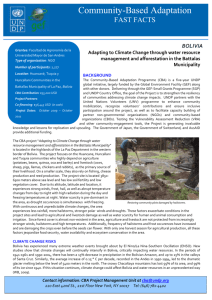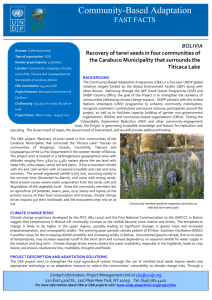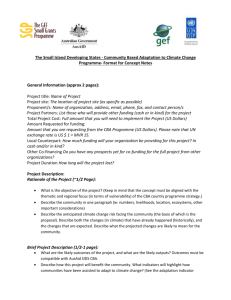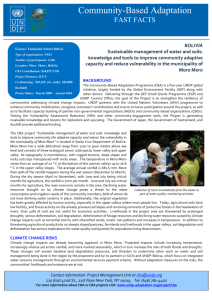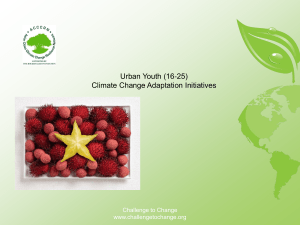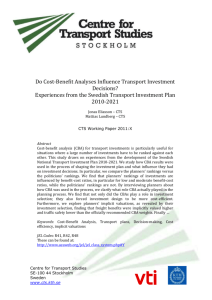- UNDP`s Adaptation Learning Mechanism
advertisement
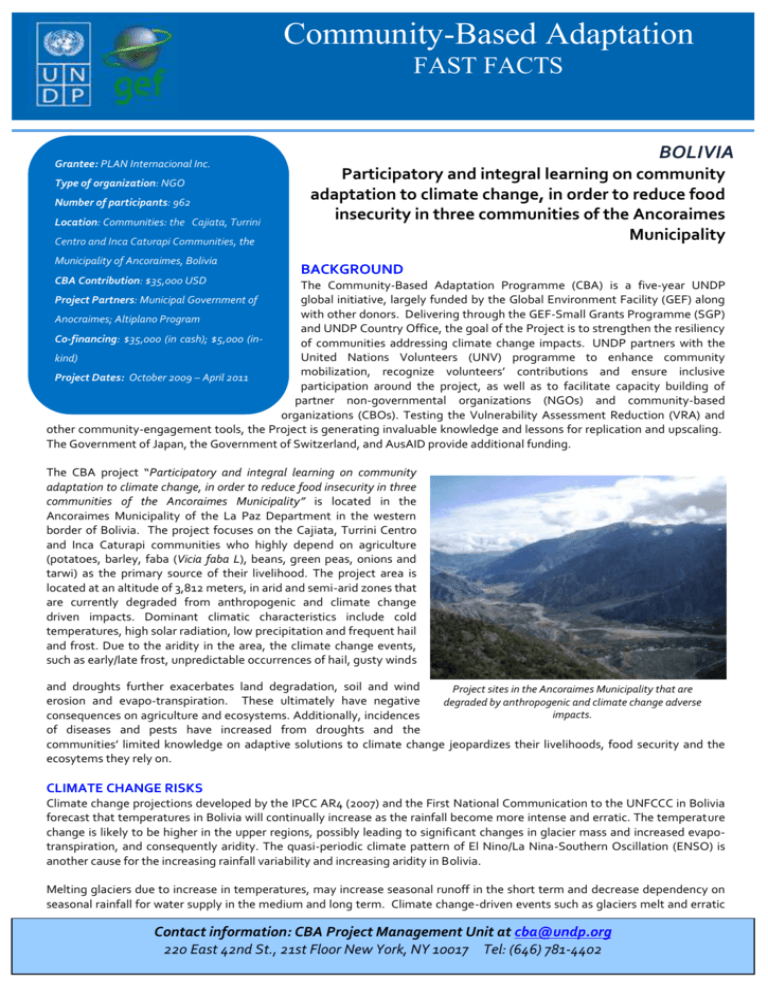
Community-Based Adaptation FAST FACTS Grantee: PLAN Internacional Inc. Type of organization: NGO Number of participants: 962 Location: Communities: the Cajiata, Turrini Centro and Inca Caturapi Communities, the Municipality of Ancoraimes, Bolivia CBA Contribution: $35,000 USD BOLIVIA Participatory and integral learning on community adaptation to climate change, in order to reduce food insecurity in three communities of the Ancoraimes Municipality BACKGROUND The Community-Based Adaptation Programme (CBA) is a five-year UNDP global initiative, largely funded by the Global Environment Facility (GEF) along with other donors. Delivering through the GEF-Small Grants Programme (SGP) Anocraimes; Altiplano Program and UNDP Country Office, the goal of the Project is to strengthen the resiliency Co-financing: $35,000 (in cash); $5,000 (inof communities addressing climate change impacts. UNDP partners with the United Nations Volunteers (UNV) programme to enhance community kind) mobilization, recognize volunteers’ contributions and ensure inclusive Project Dates: October 2009 – April 2011 participation around the project, as well as to facilitate capacity building of partner non-governmental organizations (NGOs) and community-based organizations (CBOs). Testing the Vulnerability Assessment Reduction (VRA) and other community-engagement tools, the Project is generating invaluable knowledge and lessons for replication and upscaling. The Government of Japan, the Government of Switzerland, and AusAID provide additional funding. Project Partners: Municipal Government of The CBA project “Participatory and integral learning on community adaptation to climate change, in order to reduce food insecurity in three communities of the Ancoraimes Municipality” is located in the Ancoraimes Municipality of the La Paz Department in the western border of Bolivia. The project focuses on the Cajiata, Turrini Centro and Inca Caturapi communities who highly depend on agriculture (potatoes, barley, faba (Vicia faba L), beans, green peas, onions and tarwi) as the primary source of their livelihood. The project area is located at an altitude of 3,812 meters, in arid and semi-arid zones that are currently degraded from anthropogenic and climate change driven impacts. Dominant climatic characteristics include cold temperatures, high solar radiation, low precipitation and frequent hail and frost. Due to the aridity in the area, the climate change events, such as early/late frost, unpredictable occurrences of hail, gusty winds and droughts further exacerbates land degradation, soil and wind Project sites in the Ancoraimes Municipality that are erosion and evapo-transpiration. These ultimately have negative degraded by anthropogenic and climate change adverse impacts. consequences on agriculture and ecosystems. Additionally, incidences of diseases and pests have increased from droughts and the communities’ limited knowledge on adaptive solutions to climate change jeopardizes their livelihoods, food security and the ecosytems they rely on. CLIMATE CHANGE RISKS Climate change projections developed by the IPCC AR4 (2007) and the First National Communication to the UNFCCC in Bolivia forecast that temperatures in Bolivia will continually increase as the rainfall become more intense and erratic. The temperature change is likely to be higher in the upper regions, possibly leading to significant changes in glacier mass and increased evapotranspiration, and consequently aridity. The quasi-periodic climate pattern of El Nino/La Nina-Southern Oscillation (ENSO) is another cause for the increasing rainfall variability and increasing aridity in Bolivia. Melting glaciers due to increase in temperatures, may increase seasonal runoff in the short term and decrease dependency on seasonal rainfall for water supply in the medium and long term. Climate change-driven events such as glaciers melt and erratic Contact information: CBA Project Management Unit at cba@undp.org 220 East 42nd St., 21st Floor New York, NY 10017 Tel: (646) 781-4402 rainfall lowers the water availability, especially in the highlands, leading to crop failure, soil erosion, biodiversity loss, mudslides, droughts and floods. PROJECT DESCRIPTION AND ADAPTATION SOLUTIONS The CBA project aims to strengthen the communities’ resiliency to climate change by generating participatory and integral learning systems on adaptive solutions in the face of climate change. Using a participatory approach, the project is implemeneted by PLAN Internacional Incorporated, the project partner NGO. The project increases the adaptive capacity of local communities through the following activities: Development of a methodology on the evaluation of local damages and the use of traditional knowledge of bioindicators in agricultural and livestock production. These are compared to systmatic information to anticipate probable damage to production systems exacerbated by climate change events. Dissemination of evaluation results and data through a local meteorological station to address and influence the local Community members meeting to discuss results of crop decisions and agreements aimed at reducing the risks on techniques they applied agricultural and livestock productions. Introduction of diversified seeds and production outputs that provide a more diverse alimentation, conserve and sustainably manage soils through an integrated crop management system (IMC). Techniques such as crop rotation, incorporation of solid and liquid fertilizers usage, that are in harmony with agroforestry systems, are used. Introduction of new fruit trees adapted to the environmental conditions of the community Implementation of agroforestry practices Awareness raising workshops for children, adolescents and their families on climate change adaptation, including educational fairs with tutorials for teaching modules on climate change for high school students. This project increases the community awareness and adaptive capacity through comprehensive and participatory approach on sustainable resource management to protect their food security, livelihoods and natural resources from increasing temperatures, evapo-transpiration and aridity brought on by climate change and anthropogenic impacts. FOCUS ON... Global environmental benefit The project aims to generate global environmental benefits by 1.) reducing persistent organic pollutants through implementation of integrated crop management systems; 2.) lowering CO2 emissions through the sequestration of trees,shrubs and fruit crops; 3.) protecting fragile ecosystems, land management and combating erosion and desertification; 4.) protecting and conserving agro-biodiversity (Andean crops); and 5.) co-existing and using environmentally friendly practices. Community participation and sustainability The project was developed and implemented through a participatory approach. Awareness-raising and adaptive capacity workshops are held to enhance the communities’ knowledge on climate change and teach them the sustainable solutions to adopt. Policy Influence Since the objective and activites of the project are in conjunction with the political and administrative activities of the municipal government, the best practices generated from the project will be integrated into the participatory municipal planning on human development and sustainable management of natural resources. For more information about CBA or CBA projects visit: www.undp-adaptation.org/project/cba Further information, lessons learned, and experiences gathered from climate change adaptation activities globally are available at the Adaptation Learning Mechanism: www.adaptationlearning.net
